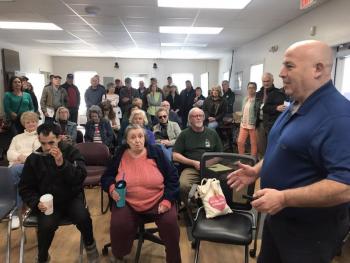LePage’s energy advisor meets with Lincoln County Republicans
Jim LaBrecque, Paul LePage’s energy advisor, was the Lincoln County Republican Committee’s guest speaker at our meeting in Newcastle on April 23. He spoke to a standing-room-only crowd of interested and engaged listeners. He started his story in 1973, almost 50 years ago, with the statement “Up until the oil embargo, all short-term and long-term planning and engineering was done by the utility companies. That's why we ended up with Maine Yankee, that's why we ended up with big power plants with cogeneration at paper mills, and that's why we had such cheap electricity. Everything was going good, but then the legislators started to tell the utility companies what to do.”
Jim then spent the next hour giving the listeners a history lesson of decades of bad bills and bad decisions that have left us with very expensive electric power and with Central Maine Power reduced to the role of bill collector for failed projects, buyouts, and many other special interests. A failed biomass program resulted in the forced buy out of hundreds of millions of dollars of contracts, amortized over decades, all being paid for by the consumer. In one case $25 million was paid to someone not to build a biomass plant. Bill LD 1711, Net Energy Billing, when fully implemented, will cost ratepayers $370 million per year and many billions over the lifetime of the program. As an example, the solar industry is getting a 400% premium over market costs.
He then gave a list of where the money is going and who is profiting off high electric bills. The list of winners is: onshore wind developers, solar developers, solar owners, electricity roviders, wholesale generators, Efficiency Maine, the biomass industry, trash-to-energy industry, tidal power, and other costly programs paid for by our utility bills and forwarded to special interest groups. The loser list is much shorter, it is the residential user, Maine’s struggling businesses, and CMP that is being used as the scapegoat of rate increases.
He noted that, if solar were to replace the 1200-megawatt Central Maine Power Corridor (Quebec Hydro) it would take about 110 solar farms totaling 54,500 acres and containing 25 million solar panels. In around 20 years solar panels reach the end of their useful life and will become a disposal problem. The 25 million solar panels will become 35,000 tractor trailers loads of waste. Where do we bury them? There is also an unknown risk to both the commercial solar industry and private owners. If the solar panels cannot be disposed of as general waste, then specialized disposal is required. No one can say what that cost will be in 20 years. It could be prohibitive and passed on to “someone else.” Presently there are 600 applications for solar projects in Maine. Each will add to the cost of electricity, require costly backup generation when they are not producing, will require new power lines connecting them to the grid, will make the grid less reliable, and ultimately, will need to be disposed of. He noted that LD 1711 Net Energy Billing will only work until “The rich people run out of poor people's money to spend” and that's going to happen very quickly unless changes are made.
The solution, according to Jim, is to put fiscally responsible Republicans back in charge. Let utility engineers and business men and women unravel the patchwork of programs, failed projects, and bad decisions. Get electric costs down and at the same time reduce fossil fuel usage by being smart and green. More information from Jim’s presentation can be found on our website at lincolncountyrepublicans.org.
























